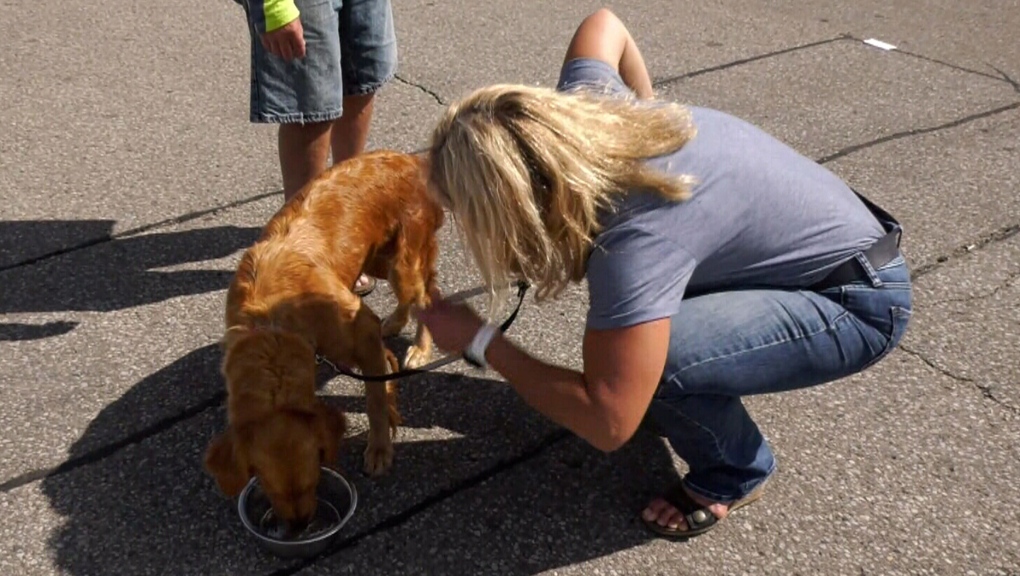Last flight of international rescue dogs lands in Toronto ahead of import ban
The last flight of internationally rescued golden retrievers touched down at Toronto Pearson International Airport on Tuesday ahead of a new policy that will ban the import of dogs from more than 100 countries at the end of the month.
At Pearson, emotions ran high as the dogs met their new owners for the first time.
"We've had two previous rescues and it's a great life for them and a great life for us," said Lou Vanderploge who was among more than 40 families adopting the dogs.
The golden retrievers were rescued from shelters in Cairo, Egypt and brought to Canada by the non-profit organization Golden Rescue.
The group has rescued more than 1,700 dogs from abroad, but this is their last international rescue amid the new policy, put in place by the Canadian Food Inspection Agency (CFIA).
"It would have been nice if the CFIA had gone in and looked at our policies and procedures," said Dr. Scott Bainbridge, a veterinarian and Golden Rescue board member. "After bringing over 1700 hundred dogs we have never brought a rabid dog over."
The agency says as of Sept. 28, which is World Rabies Day, the entry of commercial dogs from countries it considers at high-risk for canine rabies will be prohibited.
 The CFIA defines "commercial dogs" as those for resale, adoption, fostering, breeding, show or exhibition, research and other purposes.
The CFIA defines "commercial dogs" as those for resale, adoption, fostering, breeding, show or exhibition, research and other purposes.
Egypt and Turkey are on the list which are the two countries Golden Rescue imports dogs for adoption.
Since learning of the ban in June, the group has scrambled to bring 130 rescues to Canada.
"There are thousands of dogs in the shelter system - it is a matter of life and death - the conditions, health care are not great," said Dr. Bainbridge.
The agency says the ban is necessary to reduce the risk of dog rabies entering Canada which it says poses a serious health risk to Canadians and their pets and once symptoms appear in humans, the disease is almost always fatal.
According to CFIA, two dogs from Iran imported into Canada with the disease. Canada does not currently have any confirmed cases of dog rabies.
"The importation of even one rabid dog could result in transmission to humans, pets and wildlife," the agency stated in a public notice published in June.
“We are heartbroken by CFIA’s decision, and we are beyond disappointed that CFIA did not reach out to the rescue community prior to making the decision to impose the ban," said Viive Tamm, Golden Rescue’s Board Chair.
"Had they done so, we would have been able to alleviate their concerns regarding the potential for importing rabies into Canada.”
Animal rights advocates and rescue groups are calling for exemptions or modifications to the new measure so they are able to continue their rescue efforts while at the same time keeping the public and domestic animals safe.
"We are strict with vaccine protocol, we actually run rabies titers before they come over to show if they were exposed to rabies they would be protected," said Dr. Bainbridge.
When asked about potential exemptions a CFIA spokesperson stated, "The CFIA has developed an approach that is relevant and proportionate to the current public health risks to animals and people, and takes into account aspects such as the CFIA’s regulatory framework and infrastructure, including quarantine facilities at points of entry."
Unless there are exemptions, Golden Rescue says it will focus its efforts in Ontario, Quebec and British Columbia.
CTVNews.ca Top Stories

NEW Freeland to present 2024 federal budget, promising billions in new spending
Canadians will learn Tuesday the entirety of the federal Liberal government's new spending plans, and how they intend to pay for them, when Deputy Prime Minister and Finance Minister Chrystia Freeland tables the 2024 federal budget.
Ontario woman charged almost $7,000 for 20-minute taxi ride abroad
An Ontario woman was shocked to find she’d been charged nearly $7,000 after unknowingly using an unauthorized taxi company while on vacation in January.
Worker seriously injured after fall at Montreal Olympic Stadium
A man is fighting for his life after falling about 30 feet in an air duct at Montreal's Olympic Stadium on Monday, authorities say.
Tim Hortons launches pizza nationally to 'stretch the brand' to afternoon, night
Tim Hortons is launching flatbread pizzas nationally in a bid to pick up more afternoon and evening customers.
A look inside the gutted 24 Sussex Drive
The National Capital Commission is providing a glimpse inside the gutted 24 Sussex Drive, more than a year after the heritage building along the Ottawa River was closed.
NASA confirms mystery object that crashed through roof of Florida home came from space station
NASA confirmed Monday that a mystery object that crashed through the roof of a Florida home last month was a chunk of space junk from equipment discarded at the International Space Station.
Hazard ahead: Are cuts at Tesla a warning sign for the EV market in Canada?
Tesla has hit a series of roadblocks, including increased competition and declining sales. The company announced Monday it is slashing 10 per cent of its global workforce.
Fire rages through the 17th-century Old Stock Exchange in Copenhagen, toppling the iconic spire
A fire raged through one of Copenhagen's oldest buildings on Tuesday, causing the collapse of the iconic spire from the 17th-century Old Stock Exchange as passersby rushed to help emergency services save priceless paintings and other valuables.
Budget 2024 'likely to be the worst' in decades, former BoC governor says
Without having seen it, former Bank of Canada governor David Dodge believes that Tuesday's 2024 federal budget from Deputy Prime Minister and Finance Minister Chrystia Freeland is 'likely to be the worst budget' in decades.




























